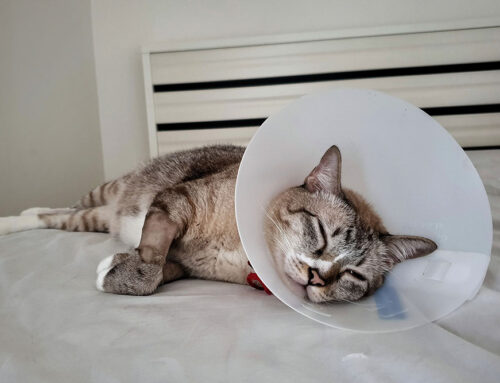Springtime is itchy time, with bug bites, allergies, and humidity making people and their pets deeply miserable. While allergies are the most common causes for pets’ chronic itchiness, parasites and high humidity are also big problems in our state, contributing to skin infections and hot spots. If your pet’s scratching is out of control, our Lebanon Animal Hospital team wants to help you identify your furry pal’s itchiness problem and provide them with the relief they deserve.
How do I know if my pet is itchy?
An itchy pet is hard to ignore—they often lick, chew, scratch, or bite at their skin incessantly. Pets with itchy faces, eyes, or ears may rub against the carpet or furniture, or rub these body areas with their paws. Your pet may also have scratch marks on their skin, or thin or missing hair sections. If your pet has light-colored hair, they may have reddish-brown staining from a compound in their saliva.
What are the most common itch causes in pets?
Itchiness (i.e., pruritus) is not a disease or condition in itself but is a common sign of a skin or systemic health condition. The most common causes of itchy pets include:
- Allergies — Pets can be allergic to flea bites, environmental substances (e.g., pollen, mold, dander), or—less commonly—food. Allergies are dogs’ most common skin disease, affecting up to one-third of the canine population.
- Parasites — Fleas and ticks can induce allergic skin reactions, but the itchiest skin parasites are mites. The Sarcoptes mite causes intense, deep itching. These mites can spread to other household pets or family members.
- Skin infections — Bacterial and fungal skin infections are itchy conditions that can occur on their own, but more often occur secondary to other problems. Allergies and endocrine disorders can lead to secondary skin infections, which then compound itchiness.
Other skin conditions, including autoimmune diseases or skin cancers, can also lead to itching, but these are far less common than the causes already discussed. Many itchy pets have more than one itch cause. For example, a pet with fleas may be itchy from the flea bites themselves, and may also develop a flea bite allergy.
How do veterinarians diagnose the cause of a pet’s itchiness?
Skin diseases can be tricky to diagnose because more than one cause is often at play. Our Lebanon Animal Hospital team will initially perform a few basic skin tests in our facility, including:
- Skin cytology — A skin sample is examined under the microscope to identify bacteria, yeast, and inflammatory or infection-fighting cells.
- Skin scraping — A deep skin scrape collects skin cells in the deeper skin layers to look for mites.
- Fungal culture — A fungal culture is most often used to identify or rule out ringworm, a common fungal infection.
- Bacterial culture — Determines the bacteria responsible for a pet’s skin infection, and the organism’s antibiotic susceptibility.
- Skin biopsy — Provides a definitive diagnosis for more complex or uncommon skin conditions.
If these tests aren’t helpful, our team may recommend blood tests to evaluate your pet’s hormone levels and overall health. We may also recommend allergy testing, or a special allergy diet trial. To determine the most likely underlying causes for your pet’s misery, we’ll also consider their health history, itch patterns, and their response to certain treatments.
Can treatments help relieve my pet’s itch?

Treatments for itchiness are aimed at resolving the underlying cause and improving your pet’s comfort level. Common treatments for itchiness include:
- Topical, oral, or injectable parasiticides to kill and prevent external parasites such as fleas, ticks, and mites.
- Antihistamines, immune suppressants, and anti-inflammatories to reduce inflammation and itch.
- Medicated shampoos, creams, powders, mousses, and sprays to reduce itch and treat or prevent skin infections.
- Oral antibiotics or antifungals for difficult infections.
Some itch causes are curable while others are not. Treatments for ongoing itch causes, such as allergies, may take some trial, error, and tweaking to find the right combination for your pet. Allergies and other chronic skin diseases can change over time, and we’ll schedule regular checkups for your pet to ensure their treatment is still effective.
Constant itching can have a deeply negative impact on your pet’s quality of life, and can prevent you and your pet from enjoying daily activities or getting enough rest at night. If your pet has been biting, licking, or scratching, schedule an appointment with our Lebanon Animal Hospital team, and get your pet the relief they deserve.








Leave A Comment